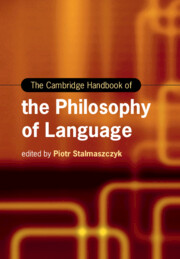Book contents
- The Cambridge Handbook of the Philosophy of Language
- Cambridge Handbooks in Language and Linguistics
- The Cambridge Handbook of the Philosophy of Language
- Copyright page
- Contents
- Figures
- Tables
- Contributors
- Preface
- 1 Philosophy of Language: Definitions, Disciplines, and Approaches
- Part I The Past, Present, and Future of Philosophy of Language
- Part II Some Foundational Issues
- Part III From Truth to Vagueness
- 11 Truth and Theories of Truth
- 12 Reference and Theories of Reference
- 13 Names in Philosophy
- 14 Indexicals and Contextual Involvement
- 15 Natural Kind Terms
- 16 Vagueness in Natural Language
- Part IV Issues in Semantics and Pragmatics
- Part V Philosophical Implications and Linguistic Theories
- Part VI Some Extensions
- References
- Index
13 - Names in Philosophy
from Part III - From Truth to Vagueness
Published online by Cambridge University Press: 12 November 2021
- The Cambridge Handbook of the Philosophy of Language
- Cambridge Handbooks in Language and Linguistics
- The Cambridge Handbook of the Philosophy of Language
- Copyright page
- Contents
- Figures
- Tables
- Contributors
- Preface
- 1 Philosophy of Language: Definitions, Disciplines, and Approaches
- Part I The Past, Present, and Future of Philosophy of Language
- Part II Some Foundational Issues
- Part III From Truth to Vagueness
- 11 Truth and Theories of Truth
- 12 Reference and Theories of Reference
- 13 Names in Philosophy
- 14 Indexicals and Contextual Involvement
- 15 Natural Kind Terms
- 16 Vagueness in Natural Language
- Part IV Issues in Semantics and Pragmatics
- Part V Philosophical Implications and Linguistic Theories
- Part VI Some Extensions
- References
- Index
Summary
One of the central functions of language is to enable speakers to communicate about the world. For this to be possible, it seems that at some level language should be able to “hook on to” reality. Such level (if any) is often described as the referential level (cf. Martí, Chapter 12, this volume), and linguistic terms operating at that level are called referring terms. Among the latter, philosophers typically distinguish (as to so-called kind terms, which refer to kinds rather than to particulars, cf. Fernández Moreno, on natural kind terms, Chapter 15, this volume) those which not only hook on to reality, but in addition accomplish that by referring to basic elements of reality, namely objects/individuals (in contrast with, e.g., the substance referred to by the natural kind term water). This is the class of singular terms, whose paradigmatic exemplars are often taken to be proper names.
- Type
- Chapter
- Information
- The Cambridge Handbook of the Philosophy of Language , pp. 249 - 265Publisher: Cambridge University PressPrint publication year: 2021
- 1
- Cited by

